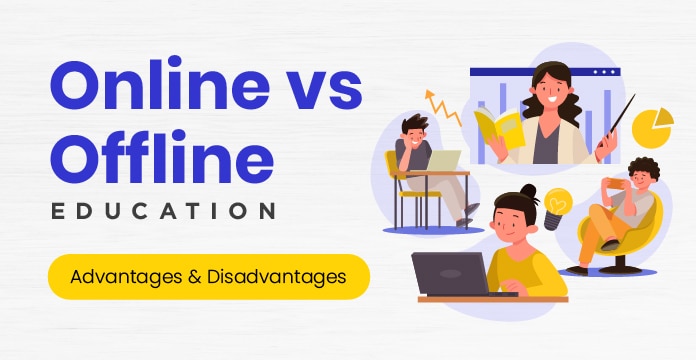Online vs Offline Education: Advantages and Disadvantages:
The pandemic has brought about changes that previously seemed far off in the future. The “new normal,” as we’ve dubbed it, is a world we’d only glimpsed or read about in bits and pieces in science fiction books and movies. We never anticipated, however, that we would see something comparable to those fictitious scenarios in real life.
If we were to list all of the changes that have occurred in people’s daily lives, the list would be endless, but one important shift that we can all notice is in the education sector. The entire global education system has been turned upside down. This change was not modest, and it lasted for more than a year. Students may even feel a little strange if they return to the classroom because it has become so remote. This is still true in many places of the world today. The majority of today’s learning takes place online, or through screens, with the aid of technological platforms.
While the majority of individuals (students and their parents) have adapted to the new online curriculum, others still struggle and prefer the offline curriculum. There is also an ongoing debate behind the scenes among students and parents regarding which of the two educational mediums is better. While there is no perfect solution, the basic reality is that both online and offline courses offer advantages and disadvantages. When compared to one another, they both seem to stand on their own and appear to be the ideal structure for a certain situation. In this blog we will discuss a few major advantages and disadvantages of online and offline education.
Online Education
There is no denying that online education has grown in popularity since the pandemic. Although not a novel concept, a few aspects of online education had been integrated into the school curriculum even before the pandemic in the form of smart classrooms. Aside from that, the medium was mostly known because of various ed-tech ventures such as Unacademy and Byju’s. Today, online education is almost synonymous with attending school, with students sitting in front of a screen watching their teacher educate. Students even give tests online, in addition to attending classes via screens to submitting homework and assignments through online groups and forums. Students were able to receive at least some form of education even in a situation as dire as a global pandemic, thanks to online education.
Advantages of Online Education
Flexible: Online classes allow students to be more flexible with their schedules because they can attend classes from the comfort of their own homes. They can divide their time and plan their daily schedule accordingly. This flexibility also allows them to learn about other things that interest them; they can take online lessons or enrol in other courses. As a result, they expand their knowledge as well as their personality. Aside from that, they can even spend the rest of their time developing their offline hobbies.
Ease of Access: Online education is easily available everywhere and at any time if one has a reliable internet connection. In contrast to offline lectures where you only attend once and take notes, students can record online classes and sessions for future reference.
Affordable: In comparison to offline school, where fees range from transportation to uniforms, extracurriculars, and a variety of other things, the whole education cost in online education is deducted fairly. Apart from the fixed costs, the only costs are the internet connection and devices, both of which are widely available in most families today.
Comfortable and convenient: Because of the reasons stated above, online education is far more convenient than traditional education. Even when it comes to attending classes, students feel more at ease in online classes. The medium as a whole not only saves time but also resources for students and teachers.
Disadvantages of Online Education
Technical Issues: Any connectivity issues that may arise are one of the key downsides of online education. Because electricity and connectivity are very unprecedented, depending on the geographical area, technical challenges may arise, which can be a significant barrier to online education.
Indifferent attention: For a teacher, one of the major disadvantages of online education is managing student attention. When a teacher is teaching an online class, it can be difficult for them to focus on each and every student. It can be tough to tell who is focused and who is simply attending the class for the sake of attending. Overall, it means less interaction between the teacher and the students, which could make it difficult to communicate what is being taught effectively.
Screen Time: Another significant and unavoidable disadvantage of online classes is the amount of time spent in front of the computer. Students end up looking at screens for longer periods of time than usual, which might be harmful to their health.
Minimal Peer Engagement: Online education, unlike offline education, does not allow students to engage with their peers on a daily basis. A kid can video chat and converse on the phone with friends and peers, but it isn’t the same as having those conversations in a school setting. Interaction with classmates in school teaches a student a lot of things and aids in the development of numerous skills such as leadership, teamwork, and so on. Online education eliminates the need to attend school, resulting in little to no interaction with peers and a significant loss of experience.
Offline Education
Due to the pandemic, offline schooling has suddenly become a luxury. For students, the meaning of education has shifted as going to school has become more challenging. Students used to learn not only from books, but also through interacting with their peers and teachers, as well as by experiencing a variety of scenarios and obstacles in school. But this was all put to pause because of the pandemic in the past year and a half. Because of the ever-changing rise and decrease in the number of diseases, students in many regions of the world still do not have the luxury of attending school.
Advantages of Offline Education
Experience: Experience is undoubtedly one of the most significant advantages of offline education. When a student attends school, they not only spend their time studying through textbooks, but they also live in a specific environment. This allows kids to study a variety of lessons that aren’t covered in their textbooks. Interaction with peers and teachers aids in the acquisition of certain life skills such as leadership, communication, and so on, and plays an important role in the development of their personalities.
Attention: For both students and teachers, attention comes naturally and easily in an offline situation rather than online. Because a teacher may pay greater attention to individual students in a classroom, kids tend to pay more attention because they are afraid of being called out by the teacher. This makes it simple for both the teacher and the students to deliver and comprehend the lesson.
No distractions: Since a classroom is enclosed and everyone sitting there usually has the same goal, there are fewer distractions for a student as compared to sitting in front of a screen alone listening to a lecture.
Disadvantages of Offline Education
Time Management: It is an irrefutable fact that a school day is jam-packed and that students spend the entire day on campus. Even if the students return home in the evening, exhaustion takes its toll, and the remaining time is spent resting. When compared to online schooling, this may appear to be a disadvantage because the online format allows for more time flexibility. Because no time is spent commuting, the time saved can be spent on other activities such as hobby classes. Students can also save a lot of energy in online classes compared to offline classes and put it to better use.
Extra Resources : Offline education necessitates a completely different type of curriculum that goes beyond textbooks and reading. This implies more resources are spent, which can be a drawback when compared to online education, where you only have to spend money on the internet and gadgets aside from the fixed costs.
No Recordings of Classes: To this day, it is almost unusual to be able to capture an ongoing lesson. So, in an offline education context, you’d be lucky to acquire recorded recordings of the sessions you attended; instead, you’d have to make do with the notes you took during class. With contrast, it is the polar opposite in online education.










2 Responses
niceee
This breakdown really captures the tension between convenience and connection in education today. The shift to online learning definitely opened new doors, but it also made people realize what gets lost without physical interaction. I was reading a comment on Lunchtime results ([Link deleted]where someone mentioned how students’ motivation and focus dropped once screens replaced classrooms—felt pretty relatable. Striking the right balance seems more important than ever.